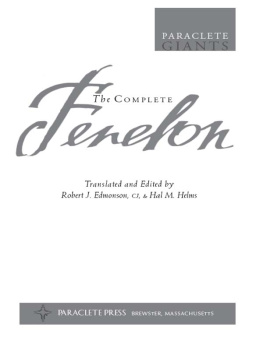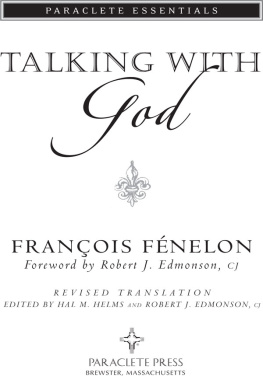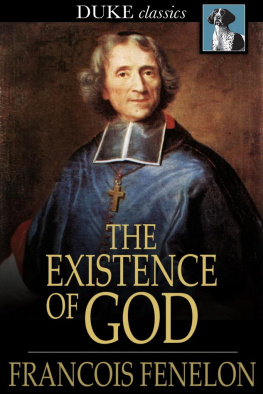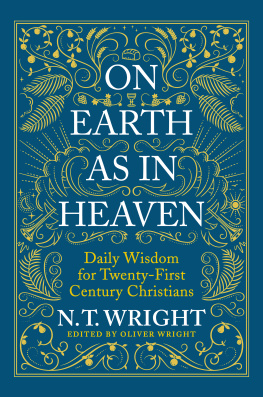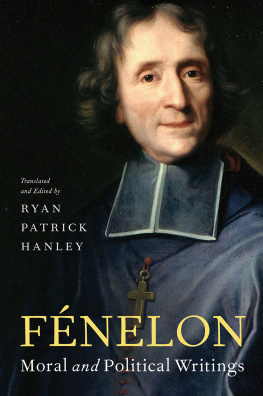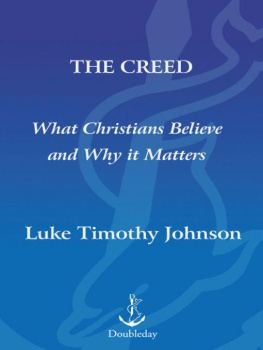THE COMPLETE FNELON

ABOUT THIS SERIES:
Each Paraclete Giant presents collected works of one of Christianitys greatest writers giants of the faith. These essential volumes share the pivotal teachings of leading Christian figures throughout history with todays theological students and all people seeking spiritual wisdom.
Forthcoming in this Series
THE COMPLETE JULIAN
by Father John-Julian, OJN
Spring 2009
THE COMPLETE THRSE
Edited with translations by Robert J. Edmonson, CJ
Fall 2009
For more information, visit www.paracletepress.com.

The Complete Fnelon
2008 First printing
Introduction, About this Edition, Meditations on the Heart of God and God of My Heart: Meditations on Feasts and Fasts copyright 2008 Robert J. Edmonson
The Royal Way of the Cross and Talking with God copyright 2008 The Community of Jesus, Inc.
ISBN 978-1-55725-607-2
Scripture quotations designated NIV are taken from the Holy Bible, New International Version. NIV. Copyright 1973, 1978, 1984 by International Bible Society. Used by permission of Zondervan Publishing House. All rights reserved.
Scripture quotations designated RSV are from the Revised Standard Version of the Bible, 1946, 1952, 1971 by the Division of Christian Education of the National Council of the Churches of Christ in the United States of America, and are used by permission.
Scripture quotations designated NRSV are from the New Revised Standard Version Bible, copyright 1989 by the Division of Education of the National Council of Churches of Christ in the U.S.A., and are used by permission. All rights reserved.
Scripture quotations designated NEB are from the New English Bible, 1961, 1970 by Oxford University Press and Cambridge University Press, and are used by permission.
Scripture quotations designated TEV are from the Todays English Version, 1966, 1971, 1976 by American Bible Society, and are used by permission.
Scripture quotations designated KJV are from the Authorized King James Version of the Bible.
Scripture quotations designated VULGATE are from the Douay-Rheims version of the Bible.
Library of Congress Cataloging-in-Publication Data
Fnelon, Franois de Salignac de La Mothe-, 1651-1715.
[Selections. English. 2008]
The complete Fnelon / translated and edited by Robert J. Edmonson and Hal M. Helms.
p. cm.
ISBN 978-1-55725-607-2
1. Spirituality--Catholic Church. 2. Spiritual life--Catholic Church. 3. Fnelon, Franois de Salignac de La Mothe-, 1651-1715--Correspondence. 4. Meditations. 5. Church year meditations. I. Edmonson, Robert J. II. Helms, Hal McElwaine. III. Title.
BX2182.3.F47213 2008
282--dc22
2008021654
10 9 8 7 6 5 4 3 2 1
All rights reserved. No portion of this book may be reproduced, stored in an electronic retrieval system, or transmitted in any form or by any meanselectronic, mechanical, photocopy, recording, or any otherexcept for brief quotations in printed reviews, without the prior permission of the publisher.
Published by Paraclete Press
Brewster, Massachusetts
www.paracletepress.com
Printed in the United States of America
INTRODUCTION TO
The Complete Fnelon
I n 1651, when Franois Fnelon was born, an exhausted Europe was recovering from the Thirty Years War. Britain could not provide a balance of power, embroiled as it was in the civil war that had led to the execution of its king in 1649. So the 1648 Peace of Westphalia had left France as the dominant power in Europe. Within France, a series of revolts against the crown had begun in 1648, and the outcome of the struggle was by no means certain.
France dominated in the arts and letters as well as in politics. The creation of the Acadmie Franaise (the French Academy) in 1635 had standardized the French language. In 1637 Ren Descartes had established the principles of modern science and philosophy. Throughout Europe, the French language and French science and culture were held in such high esteem that the use of French was widespread in every court. The scene was set for the golden age of French literature.
It was into this moment of history that Franois Fnelon was born in southwestern France. Like so many of the ancient minor nobility, Fnelons parents had a large familyand a long list of creditors. But their fervent loyalty to the crown during the revolts brought them letters of gratitude from the king. So when Fnelon chose to follow his uncle, the bishop of Sarlat, in pursuing a career in the church, his familys solid reputation had paved the way for his entry into higher studies. After being ordained and completing his doctorate in 1677, Fnelon soon began to minister, to preach, and to write.
During Fnelons childhood, the young Louis XIV firmly suppressed the disaffected nobles, and then contrived to keep the most powerful of them under his thumb by building the lavish palace of Versailles and enticing them to live there. He kept them busy with endless balls and theatrical and musical performances.
With the nobles firmly under his control, Louis turned his attention to another perceived threat to the unity of his realm. The Edict of Nantes (1598) had granted a measure of religious liberty to Protestants. After the death of Louis queen in 1683 and his marriage to the devout Catholic Madame de Maintenon in 1684, Louis was not long in revoking the right of Protestants to practice their religion. Many fled the country, and those who stayed were required to convert to the Catholic faith.
Fnelons talent having been quickly recognized, he was named soon after ordination as superior of a Paris mission to new converts to the Catholic church. By 1684 he was invited to preach in Meaux, whose bishop, Bossuet, was counted among Frances finest orators. Soon Fnelon was invited to go on a preaching mission with the renowned prelate.
The revocation of the Edict of Nantes in 1685 created a need for the best Catholic preachers in France. The young Fnelon was named director of the mission to convert the Protestants of Saintonge and Aunisthe center of French Protestantism. There, Fnelon won the hearts of the Protestants with his gentleness and moderation. But Fnelons restraint did not pass unnoticed among more extreme Catholic factions, who blocked his nomination as bishop of Poitiers.
His mission among the Protestants accomplished, Fnelon returned to Paris where he served as spiritual director to the duke and duchess of Beauvilliers and their family of eight daughters. Out of this experience came Fnelons first major work. The Education of Girls revealed a remarkable presentation of the value of education for young women.
In 1689 the duke of Beauvilliers was named governor over the kings sons and grandsons. Having revealed his abilities as a teacher and preacher, Fnelon was immediately made personal tutor to the kings grandson, the young duke of Burgundy. By the age of thirty-eight Fnelon had achieved a prominent platform for his gentle teachings.
For the benefit of his pupil, Fnelon wrote his Fables (moral lessons in the form of fairy tales), his Dialogs of the Dead (in which bygone historical figures tell what they learned from life), numerous spiritual writings, and The Adventures of Telemachus (a commentary in epic style on how kings ought to reign). For nearly ten years he devoted himself to his charge, patiently turning this wild young man into a model of docility.

